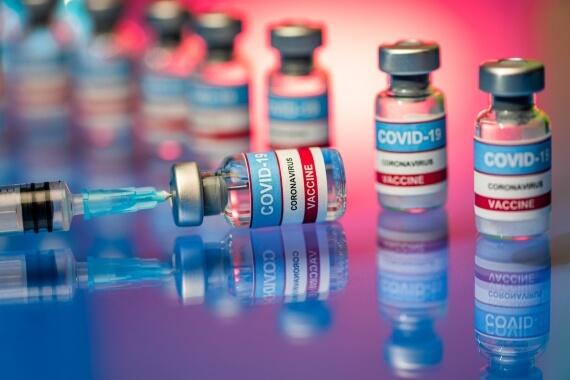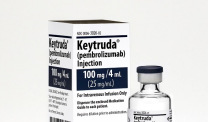COVID Vaccine Gives Less Protection for Some Cancer Patients
Treatment & DoctorsWritten by Sean Marchese, MS, RN | Edited By Walter Pacheco

Millions of people across the United States have begun receiving their COVID-19 vaccines, and restrictions are lifting in many public spaces such as restaurants and bars.
Mesothelioma patients may be looking forward to returning to life as it was before the pandemic. However, a new study reports that the COVID-19 vaccine may not sufficiently protect patients with compromised or weakened immune systems.
The study results suggest that people with cancer or who are undergoing cancer treatment may still be highly vulnerable to COVID-19 even after their vaccination.
Researchers published their findings earlier this month in the Journal of the American Medical Association. The study is the first of its kind to showcase the effectiveness of a COVID-19 vaccine on patients with suppressed immune systems.
Participants in the study included 436 organ transplant recipients. After a solid organ transplant, patients must take immunosuppressant medication to prevent tissue rejection. After the participants received the first dose of a COVID-19 mRNA vaccine, only 17% developed detectable antibodies to the SARS-CoV-2 virus, which causes COVID-19.
By comparison, 100% of people with functioning immune systems develop antibodies after receiving the first dose of Pfizer-BioNTech or Moderna vaccines. The Centers for Disease Control and Prevention don’t currently have guidelines for immunosuppressed patients, and the new research suggests this population may not have complete protection after vaccination.
COVID Vaccine Still Essential for Cancer Patients
Based on the new research results, protective behaviors remain as crucial as ever to mesothelioma patients. A compromised immune system caused by cancer or cancer treatment makes COVID-19 protection after a vaccine less effective but no less critical.
The authors of the study emphasize that the results take into account only one dose of the vaccine. Additional research is ongoing to determine antibody production in the immunocompromised population after the second vaccine dose.
COVID-19 vaccines are safe and effective for most cancer patients, including those undergoing active treatment. Patients should always have a conversation with their doctor before receiving a vaccine, but effectiveness rates should not cause any hesitation. Any amount of protection is better than none.
Ongoing research for vaccine effectiveness also requires more insight into whether COVID-19 immunity is possible with lower amounts of antibody. A study from August 2020 reported that some T-cells, a type of immune cell, can protect against COVID-19 even when antibodies are not present.
Mesothelioma Patients More Likely to Be Immunocompromised
During the initial vaccine development, immunocompromised patients weren’t part of the clinical trials. Vulnerable populations, such as pregnant women and cancer patients, are not typically eligible for early phase clinical research trials since the risks are unknown.
As a result, the CDC develops general guidelines based on the available data, and many people may assume the vaccine protected them after the second shot. Unfortunately, cancer patients could have lower protection.
Many factors potentially weaken a person’s immune system, including:
- Cancer: Cancer’s effect on the body decreases its natural ability to produce antibodies and fight disease. The impact is worse if cancer spreads into the bone marrow, the location of white blood cell production.
- Surgery: Major surgery can weaken the immune system. Anesthesia, skin damage and hospital recovery all play a part in increasing vulnerability to disease.
- Chemotherapy: Chemotherapy drugs are the most common cause of weakened immune systems in cancer patients and cause neutropenia, decreased white blood cell counts.
- Radiation Therapy: Total body irradiation can cause low white blood counts when the radiation impacts bone marrow. Radiation therapy can also damage the skin and mucous membranes, which help keep germs out.
- Immunotherapy: Targeted therapies and immunotherapy sometimes change how a patient’s immune system fights disease, putting patients at risk for infection.
- Lifestyle Choices: Poor nutrition and diet lead to a lack of the vitamins, minerals and protein that your body needs to prevent illness. Smoking and alcohol use also weaken the immune system.
Thankfully, there are ways for doctors to determine if a patient has protection from COVID-19. Immunocompromised patients can take antibody tests to identify if their immune system has mounted a defense after receiving the vaccine.
An October 2020 study tested five commercially available antibody blood tests to determine their accuracy at identifying COVID-19 antibodies. The assays’ sensitivity ranged from 76.4% to 93.9%, and the specificity ranged from 87.0% to 99.6%.
The high diagnostic accuracy allows doctors to monitor their patients and inform them which safety precautions are necessary to continue after vaccination.
For mesothelioma and other cancer patients, the COVID-19 vaccine may not offer absolute protection, but it’s still an essential step toward beating the pandemic.






